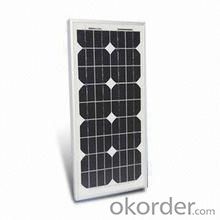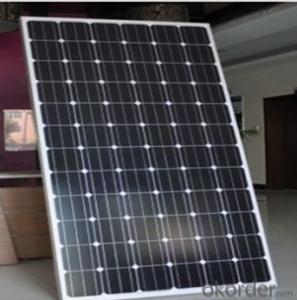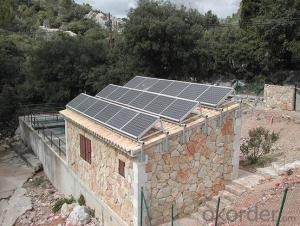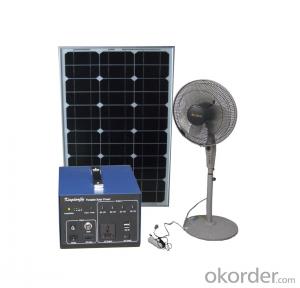45KW Solar Home Solution Approved by TUV UL CE
- Loading Port:
- Shanghai
- Payment Terms:
- TT OR LC
- Min Order Qty:
- 1 pc
- Supply Capability:
- 100 pc/month
OKorder Service Pledge
OKorder Financial Service
You Might Also Like
Item specifice
45KW Solar Home Solution Approved by TUV UL CE
Production description
PV array:
Convert sunlight instantly into DC electric power. Formed by the solar modules (also called photovoltaic
modules) in accordance with the system requirements for series and parallel.
Solar charge controller:
A charge controller may be used to power DC equipment with solar panels. The charge controller
provides a regulated DC output and stores excess energy in a battery as well as monitoring the battery
voltage to prevent over charge or over discharge. An inverter can be connected to the output of a charge
controller to drive AC loads.
Inverter:
Converts DC output power of photovaltaic soalr panels into standard AC power for use in the local off-grid
electrical network. It is a critical component in a photovoltaic system, allowing the use of ordinary
commercial appliances.
Battery banks:
Stores energy when there is an excess coming in and distribute it back out when there is a demand. Solar
PV panels continue to re-charge batteries each day to maintain battery charge.

Feature
1.High conversion efficiencies resulting in superior power output performance.
2.Outstanding power output even in low light or high temperature conditions
3.Optimized design for ease of soldering and lamination
4.Long-term stability,reliability and performance
5.Low breakage rate
6.Color uniformaity
Physical characteristic
1. Rigorous quality control meets the highest international standards.
2. High-transmissivity low-iron tempered glass, strong aluminium frame.
3. Using UV-resistant silicon.
4. IS09001/14001/CE/TUV/UL
- Q:Can solar energy systems be used in conjunction with battery storage?
- Yes, solar energy systems can be used in conjunction with battery storage. This combination allows for storing excess energy produced by solar panels during the day and using it during periods of low or no sunlight. Battery storage helps provide a continuous power supply, reduces reliance on the grid, and enhances the efficiency and reliability of solar energy systems.
- Q:What is the role of solar batteries in storing excess solar energy?
- The role of solar batteries in storing excess solar energy is to capture and store the energy generated by solar panels during periods of high sunlight. These batteries allow for the energy to be stored and used at a later time, such as during the night or on cloudy days, ensuring a continuous supply of electricity from solar power even when the sun is not shining.
- Q:Can solar energy systems be used in areas with limited access to solar energy conferences and expos?
- Yes, solar energy systems can definitely be used in areas with limited access to solar energy conferences and expos. The availability of conferences and expos may provide valuable information and networking opportunities, but they are not essential for the successful implementation and usage of solar energy systems. With the right resources and expertise, communities and individuals can still benefit from solar energy systems, even without direct exposure to conferences and expos.
- Q:Can a solar energy system be used for heating and cooling?
- Yes, a solar energy system can be used for heating and cooling through the use of solar thermal technology or heat pumps. Solar thermal systems can capture and convert sunlight into heat, which can be used for space heating and water heating. Heat pumps can also utilize solar energy to extract heat from the air or ground and transfer it indoors for heating or release it outdoors for cooling.
- Q:Can solar energy systems be used in areas with limited access to solar energy permits and approvals?
- Yes, solar energy systems can be used in areas with limited access to solar energy permits and approvals. While permits and approvals may be required in certain regions, there are often alternative solutions available. Off-grid solar systems, for example, can be installed in areas without needing permission from utility companies or government entities. Additionally, some areas may have simplified processes or incentives for renewable energy installations, making it easier to overcome permit limitations. It is important to consult local regulations and explore the available options to ensure compliance and maximize the use of solar energy in such areas.
- Q:Can solar energy systems be used for powering recycling or waste management facilities?
- Yes, solar energy systems can certainly be used for powering recycling or waste management facilities. Solar panels can be installed on the rooftops or open spaces of these facilities to harness sunlight and convert it into electricity. This renewable energy can then be used to power various operations within the facility, such as conveyor belts, sorting machines, compactors, shredders, and other equipment used in the recycling or waste management processes. Using solar energy for powering recycling or waste management facilities has several advantages. Firstly, it helps to reduce the dependence on traditional energy sources, such as fossil fuels, which are not only expensive but also contribute to environmental pollution and climate change. Solar energy is abundant and free, making it a sustainable and cost-effective option in the long run. Furthermore, solar energy systems have a low maintenance requirement, as solar panels have no moving parts and are designed to withstand harsh weather conditions. This makes them highly reliable and suitable for continuous operations in recycling or waste management facilities. Another benefit of using solar energy in these facilities is that it can offset the electricity costs associated with operating heavy machinery. Recycling and waste management facilities often have high energy demands due to the nature of their operations. By harnessing solar power, these facilities can significantly reduce their electricity bills, resulting in cost savings over time. Moreover, solar energy is clean and does not produce any greenhouse gas emissions or air pollutants during operation. This aligns with the goals of recycling and waste management facilities, which aim to minimize environmental impact and promote sustainable practices. By using solar energy, these facilities can further reduce their carbon footprint and contribute to a greener and more sustainable future. In conclusion, solar energy systems can be effectively used for powering recycling or waste management facilities. They offer numerous advantages, including reduced dependence on traditional energy sources, cost savings, low maintenance requirements, and environmental sustainability. As the technology continues to advance and become more affordable, it is expected that solar energy will play an even larger role in powering these facilities in the future.
- Q:Can solar energy systems be used for powering hotels?
- Hotels can definitely use solar energy systems to power their operations. In fact, many hotels worldwide are already utilizing solar power to fulfill their energy requirements. Solar energy systems, such as PV panels or solar thermal systems, can be installed on hotel rooftops or surrounding land to capture the sun's power and convert it into electricity or heat. Solar power offers numerous advantages for hotels. Firstly, it is a clean and sustainable energy source, contributing to reduced carbon footprints and promoting sustainable practices. By utilizing solar energy, hotels can significantly decrease their dependence on fossil fuels and lower greenhouse gas emissions. Secondly, solar energy systems provide hotels with energy independence and reduce reliance on the grid. This is especially beneficial in remote areas or during power outages, as hotels can seamlessly continue operations with their own power supply. Additionally, surplus energy generated by solar panels can be stored in batteries for use during nights or cloudy days. Moreover, installing solar panels can be a wise financial decision for hotels. While initial installation costs may be high, solar energy systems have long lifespans and can result in substantial savings on electricity bills over time. In certain cases, hotels can even sell excess energy back to the grid, generating additional revenue. Lastly, solar power can enhance a hotel's reputation and attract environmentally-conscious guests. Many travelers actively seek eco-friendly accommodation options, and hotels utilizing solar energy can position themselves as sustainable and socially responsible. In conclusion, solar energy systems can certainly power hotels, offering clean, renewable, and cost-effective energy sources. They provide energy independence, financial benefits, and enhance a hotel's reputation. As the world moves towards a more sustainable future, solar power has become an increasingly popular choice for hotels seeking to minimize their environmental impact and efficiently meet their energy needs.
- Q:Can solar energy systems be financed?
- Indeed, solar energy systems can be financed through a variety of options. Financing solar energy systems encompasses loans, leases, and power purchase agreements (PPAs). One prevalent choice for financing is a solar loan, which enables individuals and businesses to borrow funds for the installation of a solar energy system and subsequently repay the loan over time. These loans can be obtained from banks, credit unions, or solar financing companies. Solar loans offer both fixed and variable interest rates, with repayment terms spanning from 5 to 25 years. Another option involves a solar lease, wherein a third-party entity owns the solar energy system, and the homeowner or business pays a monthly lease payment to utilize the system. In this scenario, the third-party assumes responsibility for maintenance, repairs, and system performance. Solar leases frequently involve minimal to no upfront costs and can yield immediate savings on electricity bills. Power purchase agreements (PPAs) represent another popular financing alternative for solar energy systems. Under a PPA, a third-party developer undertakes the installation and upkeep of the solar panels on a customer's property, while the customer commits to purchasing the electricity generated by the system at a predetermined rate. PPAs offer fixed rates for specific periods, enabling customers to secure lower electricity costs and diminish reliance on fossil fuels. Aside from these financing options, numerous incentives and rebates are accessible to help reduce the cost of installing solar energy systems. These incentives comprise federal tax credits, state and local incentives, as well as utility-based incentives. Overall, the array of financing options available for solar energy systems has enhanced accessibility for homeowners, businesses, and organizations seeking to transition to clean and renewable energy sources.
- Q:Can solar energy systems be used for powering water pumps?
- Yes, solar energy systems can be used to power water pumps. Solar-powered water pumps use photovoltaic panels to convert sunlight into electricity, which can then be used to operate the pump. This makes solar energy an environmentally friendly and cost-effective solution for pumping water in remote areas or off-grid locations.
- Q:Can solar energy systems be used for powering off-grid eco-retirement communities?
- Yes, solar energy systems can indeed be used for powering off-grid eco-retirement communities. Solar power provides a sustainable and renewable energy source that can efficiently meet the energy needs of such communities. With proper planning and installation of solar panels, off-grid eco-retirement communities can reduce their dependence on fossil fuels and minimize their environmental impact while enjoying reliable and independent power supply.
1. Manufacturer Overview |
|
|---|---|
| Location | |
| Year Established | |
| Annual Output Value | |
| Main Markets | |
| Company Certifications | |
2. Manufacturer Certificates |
|
|---|---|
| a) Certification Name | |
| Range | |
| Reference | |
| Validity Period | |
3. Manufacturer Capability |
|
|---|---|
| a)Trade Capacity | |
| Nearest Port | |
| Export Percentage | |
| No.of Employees in Trade Department | |
| Language Spoken: | |
| b)Factory Information | |
| Factory Size: | |
| No. of Production Lines | |
| Contract Manufacturing | |
| Product Price Range | |
Send your message to us
45KW Solar Home Solution Approved by TUV UL CE
- Loading Port:
- Shanghai
- Payment Terms:
- TT OR LC
- Min Order Qty:
- 1 pc
- Supply Capability:
- 100 pc/month
OKorder Service Pledge
OKorder Financial Service
Similar products
New products
Hot products
Hot Searches
Related keywords






























